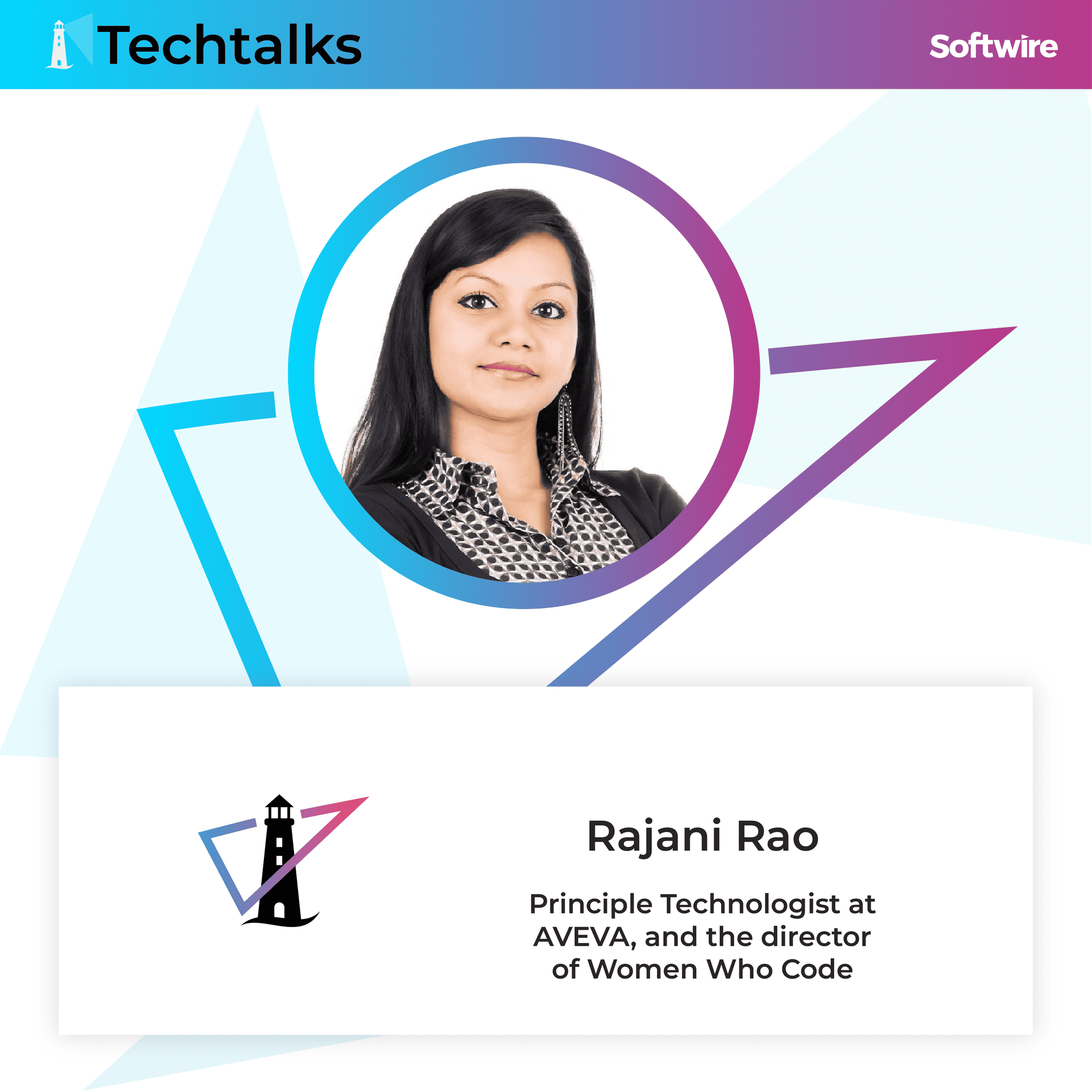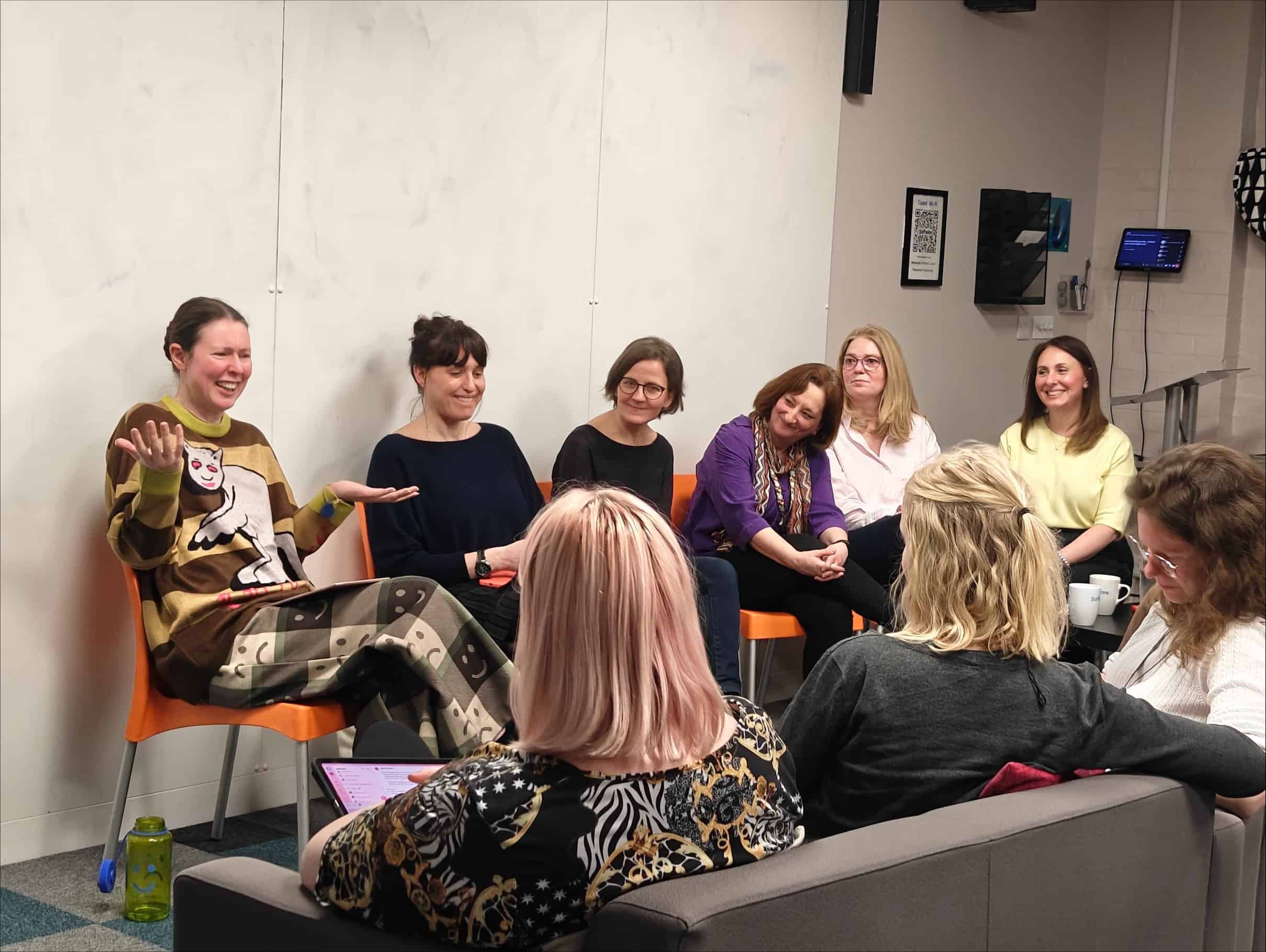“You don’t realise it until you’re older that you’ve been networking all your life.
Laura Phillips, Delivery Director, Softwire
It can sometimes feel like people are just born to network, schmooze and hold court.
For others, it’s this big, forced, uncomfortable thing that they’d happily avoid forever – especially when some people dominate the room.
It doesn’t have to be that way – nor should it be.
Because, at its heart, networking is about connection and community. And everyone deserves the opportunity to get involved, get value, and feel part of something.
In our latest episode, Helen Jackson (Principal Technical Consultant) and Laura Phillips (Delivery Director), share their experiences and provide sage advice on how you can rethink and reapproach networking:
- Key ways to make networking more inclusive at events
- How to apply the C-shape (Pac-Man technique)
- Other ways to network outside of events
- Top tips for being a better networker
Listen below:
About our guests

Laura Phillips
Delivery Director
As a Delivery Director, Laura looks after a range of projects, making sure everyone is happy – from senior customer stakeholders to Softwire’s delivery teams.
Her career has seen her work in senior tech and management roles in retail, e-commerce, health and leisure, meaning she brings a valuable blend of cross-sector experience spanning project delivery, commercials, people-management and technology.

Helen Jackson
Principal Technical Consultant
Helen is a Principal Technical Consultant, who enables her clients to effect meaningful change towards their strategic goals. She’s worked in service design, operating model design, tech strategy, software development and more, and had other careers before tech, meaning she’s seen problems from many sides and can call on the right skills for most situations.
Currently she’s part of Softwire’s Marketing team, where she focusses on getting our tech, delivery and design subject-matter experts engaged with Softwire’s marketing strategy; she provides leadership, opportunities, training, support and lots of cheerleading, alongside working to make sure marketing is a key part of career paths and recognition schemes. Outside work, Helen is a keen violinist and chamber musician, and she loves composing and arranging music for the Softwire Pantomime every year.
Transcript
[Zoe Cunningham] Hello and welcome to The Digital Lighthouse. I’m Zoe Cunningham. On The Digital Lighthouse, we get inspiration from tech leaders to help us to shine a light through turbulent times.
We believe that if you have a lighthouse, you can harness the power of the storm.
Today, I’m delighted to welcome Laura Phillips, who is a Delivery Director at Softwire, and also Helen Jackson, who is a Principal Technical Consultant.
Could I ask you both to introduce yourselves, tell us about your role at Softwire, and maybe also an interesting fact about yourself?
[Laura Phillips] Okay, hi. So I’m Laura. I joined Softwire in September 22 as a Delivery Principal, and then I became the Delivery Director about a year ago. So for this podcast, the question is, how did I know about Softwire and what a great company they are?
The answer is my network. I imagine we’ll get into that a bit more later in the podcast. Interesting fact, it’s always a hard one, isn’t it? I would say I did a skydive in Hawaii to celebrate getting engaged before we told our parents.
[Zoe] That’s amazing. Was it like a ring mid-air or just the doing it together?
[Laura] No, it was just the doing it together, although we had different people that we jumped with. It was a surprise engagement, so the ring I got was an onion ring.
[Zoe] Two interesting facts. That’s two for the price of one. Thanks, Laura.
[Helen Jackson] I’m Helen Jackson, and I’m a Principal Technical Consultant, which means I help my clients solve their business problems, often using technology. At the moment, though, I’m actually working internally, so my client is Softwire. I’m working on the marketing team, doing some changes across the whole business. I’m focusing on subject matter experts. That’s in tech, design, business teams, everyone, to engage with Softwire’s marketing as part of their jobs, enabling them to write great articles, host our own events, generally get out networking.
Interesting fact, not as interesting as Laura’s, I’m afraid. I’ve played the violin since I was three years old, and I absolutely love it. I love playing chamber music in particular, and I’ve been in the string quartet for about 16 years now, which is brilliant.
[Zoe] Wow, I’m trying to imagine a three-year-old playing a violin. Presumably it was about the same size as you then, was it?
[Helen] Yeah, so they make violins all the way down to teeny-teeny, and it was called a one-sixteenth size, and it was very cute and covered in stickers.
[Zoe] Amazing. That’s a new picture. Let’s crack on and talk about networking. I think it would be great to get both of your perspectives on this. When would you say you started networking, and why? It’s tough to answer.
[Helen] I’ve always been someone who’s known lots of people, and it took me a while to realize that that’s just the same thing. I got my job at Softwire via my network as well. Thinking about my career in tech, a friend took me to a hackathon back in about 2011, and then I got in touch with the organizer afterwards offering to help them raise money.
It was a volunteer run and free to enter. It’s NHS Hack Day, which is great. It’s actually still running.It’s still great. I just became a general busybody, and then I helped run those for quite a few years, and UK Health Camp unconference series as well with the same people. I suddenly just realized I’d become someone that people knew who I was.
I was getting messages, people asking for advice or introductions to other people or to find contractors or anything. I suddenly realized I was being networked with, and the penny suddenly dropped. Yet, it was someone that I’d met at NHS Hack Day who worked at Softwire who introduced me to Jon Artushere, and I got this job.
Alongside all of that, I was at medical school at the time, and I had a research fellowship for three years from the Royal College of Psychiatrists, meaning I was involved in the research scene and conferences and knew who everybody was, which was wonderful. I had mentors from that, and before that, I have a PhD. I studied auditory psychophysics, which is the psychology and physics of human hearing.It’s a pretty small field. It’s an amazing field, and people were totally wonderful. Again, I knew everybody from the conference scene. I hadn’t realized that was just what networking was, but it was just normal. It’s how you get anything done.
I mentioned playing the violin earlier. As a teenager, I had a string quartet with my friends, and we used to get booked for parties and weddings, and we did busking and all of that. I soon realized that the more people I spoke to while at these parties, the more work we would then get. It’s just always been like this, and for me, it’s part of having a rich life and being engaged with the world around me.
[Zoe] Yeah, it’s really interesting there that you’ve touched on a lot of the reasons I think networking is so amazing, because it’s not just about business and getting a job or closing more business or meeting clients. You can also join orchestras and make friends and an unbelievable number of other things as well. What’s your story been, Laura?
[Laura] Yeah, so I think it’s fairly similar. You don’t realize it until you’re older that you’ve been networking all your life. When I was at school, I was part of youth groups, and we would do volunteering for things.It’s a way just to make friends, but actually, that was the start of networking. The more you get out there and you meet different people, even when you’re at school, you’re networking. If you think about who you hang out with at school, you’re building your very first network there. I think a lot of people don’t realize that that’s networking. When they get told, oh you need to go networking, they think it’s something new, but actually, it’s just what we all do. It just depends on whether you care that it’s a network or you’re just making friends.
[Zoe] Well, that actually brings me on to what are the kind of misconceptions that people have about networking? I think that what you’ve both described there sounds pretty nice and pretty awesome, and why wouldn’t anyone want to do it? Why is it that everyone hears the word networking and they go, I can’t do that. Oh my God, it’s horrible.
[Laura] Yeah, so just to follow on. When I was younger and thinking about going to conferences and what have you, it was really scary and hard. I was all shy, and I thought, I don’t know how I’m going to do that, and big crowds, and that’s going to be really intimidating. But then I realized it wasn’t about the scary event. It was about establishing a relationship with one person at a time.
It doesn’t matter whether it’s a big conference or a small event, you’re doing the same thing, having a conversation like we are now. I think my favorite event for me was when I was invited to a Women in IT afternoon tea, which I thought was quite amusing at the time, if a bit stereotype.
But we had an amazing afternoon where there were about ten of us, and out of that formed the biggest network I’m in, in terms of allyship and people who support each other within the industry. It was just a way to make friends in a very informal setting. It has been brilliant. And if we hadn’t had that event, it wouldn’t have happened.
So, you know, that was really good. So I think the biggest misconception is it has to be big and you have to talk to everyone.For me, it’s about the quality of the conversation, not the quantity and where it takes us.
[Zoe] Yeah, absolutely.
[Helen] Yeah, I think I previously would have thought that networking as like a labeled activity was about wanting something and trying to get other people to give it to you or do the thing. And it just felt like slimy, like you have to have some kind of secret agenda and make your way around a room trying to get people to do it, which actually sounds more like a fun party game than a job.
But similar, like sales these days, so as a consultancy like ours, it’s not about selling people things they don’t want. It’s about finding out a way for clients to get the problem solved and we can pay our bills and generally just like enable people to work together in the way they want to.
I just read To Sell is Human again recently. Can you tell? Yeah, and again, on not having a secret agenda, like at a networking event or an event where people are talking to each other, everyone knows you’re networking. It’s absolutely far from a secret.
It’s just, yeah, meeting people, as you said, Laura, one by one, knowing what’s going on in the world, being plugged in a bit, knowing lots of people who are interested in similar things to me, having really good conversations, spotting opportunities to do favors for people. And then you end up on people’s lists when they want something done. They come and ask you, and I really love that.
I love being part of someone’s list of people who can get things done for them, being able to spot opportunities to do good and fun things together and just have a really nice time.
[Zoe] Fantastic. Well, let’s try and drill down a bit into kind of specific techniques maybe that people can use.
We’ve definitely all been in that position Laura just described of like walking into the room and being faced with this sea of people. So what are the kind of things we can do around these really awkward moments of trying to strike up a conversation or even leaving a conversation?
[Helen] Yeah, I’ve definitely felt that. Open the door, you’re like, all right, game face on, ready to go. So some of it starts with, I think, like a core belief in your value and that you’ve got something worth listening to. Like other people are talking. You get to be in those conversations if you want.
And these days, I’m just totally shameless about this. Like everyone’s there for the same reason. If I want to join a group of people who are talking, I just go and stand in the circle. And I understand that, as stated, that’s something quite simple, but not necessarily something very easy. It’s important not to force your way into conversations by just being louder than everybody else. And I think this is something that as women, we’re quite well versed in anyway because we’re not louder.
But also that just makes the room get louder and louder and more and more interrupting. And everyone’s uncomfortable and everyone’s stressed. And it’s not fun. It’s not inclusive. But if you use active listening instead to join a conversation, you kind of make room for yourself before you need to start speaking. And that’s just easier when you need to.
So that’s, yeah, focusing on speakers one at a time, approving noises, nodding your head, making sure they can see you’re paying attention. You can ask a clarifying question, get them to continue talking. And suddenly, there’s sort of social space for you.
And you haven’t just had to raise your voice like everybody else. I actually wrote an article about this recently, about being heard as a woman in a room full of men. So thinking about that thing in a tech conference and there’s this big room full of loud, noisy men. And you’re like, oh, can I possibly?
[Zoe] Which you can read, just to jump in, which you can read on the SoftWire blog at www.softwire.com.
[Helen] Thanks, Zoe. Also for leaving conversations, you said. These days, I’m just totally shameless about this. I’m not in any conversations anymore that I don’t want to be in. And again, at a networking event or a conference where everyone’s talking, everyone knows you’re there to meet people. You can just tell the truth.
It’s just so great. It’s like life’s biggest secret. You can just say, it’s been lovely meeting you, getting to know you. But I want to make sure I speak to lots of different people today. I hope we get another chance to chat later. Bye.
And start walking before you get to the end of that. And then, not stuck. If you can’t quite manage that level of honesty, which I recognize takes time to get to, you can say you need another cup of tea or go to the loo or something. You can just leave. It is totally allowed. And it’s very normal. So I think that knowing that is the secret. Yes.
[Zoe] And just quickly, on this idea of just walking up and stepping into a group, which can be difficult when people are standing quite close together or in a tight-knit kind of way, an engrossed kind of way, you know, if they’re having a fantastic conversation. Could you tell us a bit about the C-shape technique or, as I like to think of it more excitingly, the Pac-Man technique, if you’re in a group already?
[Helen] Yeah, absolutely. So this is something we can all do to make it easier for everybody else. If we all do it, the world just gets nicer.
So this is, if you’re standing in a group of people, to make sure that there’s a space in your circle, so like a circle of cake with a slice taken out of it, or a C-shape rather than an O-shape. It’s just making sure that someone doesn’t have to physically force their way into a conversation, as well as socially. And it’s really nice if we’re all mindful of that at conferences. It makes all the rooms nicer for everybody.
[Zoe] Yeah. And remembering that we’re all there for the same reason, right? You know, we want to network and so does everyone else. And we all facilitate each other. Laura, could I ask you to talk us through a bit more, like, what are challenges that you’ve found or that people you know have found of networking in tech as a woman?
[Laura] Yeah. So I have the double challenge, which obviously you can’t see on a podcast, but I’m under five foot tall. So standing around in groups of mostly men, because most of the conferences throughout my career have been mostly men.
It’s changing, still too slowly, but it is changing. But also the men seem to be really tall. So it can be really intimidating for someone like me. And often I feel like I’m not seen and it’s hard to inject. And there really aren’t enough Pac-Man shaped groups. I love that, Helen. I think we need to definitely encourage that some more.
So I think the techniques that I developed were around observing. And I focus on going to talk to people who are not in the groups or join tables where people are, because that’s an easier entry point. Because everyone’s almost the same height at a table and you’re not intimidated in the same way.
But the other thing that I found challenging, and again, I do think this is changing, was people used to assume if I was standing with a man that he was the senior person and he was the one to talk to. Very often that wasn’t the case, right? And I would find ways to ignore that and rise above it and just start talking and to let them see who I was.
And either it works or it doesn’t work. And if it doesn’t work, there’s someone else to talk to at the conference, right? You don’t have to spend your time talking to someone who doesn’t want to talk to you. I think it’s their problem, not mine, but I think it’s important not to be intimidated by it. And I think as women, we see it more than men would see it.
But I think just acknowledging it and talking about it helps other women know that it’s okay and you can just move around and you can still network, even if there are small groups who aren’t quite with the program in terms of talking to everybody. I think the challenges are becoming less, but it’s still really hard when you start. And I wouldn’t take away from that feeling. I think we have to acknowledge it and find ways of helping to support people and deal with it.
[Zoe] I would say this has changed in my experience over the last 25 years. I find that there are now a lot more networking groups or events or opportunities specifically for women in tech. And I think that while you don’t want to do all your networking only with women, for example, having that to mix it up and kind of give you a different experience. Yeah.
[Laura] Yeah, I think that’s true. And I think the nice thing about the networks I have is whenever any of us are going to a conference, we post on the groups that we’re going to a conference and we try and find ways to meet so that we’re not walking in alone. And I think, again, that’s the power of your network outside of the conference that you’re going to is that you can find other people who will support you when you’re in the room.
[Zoe] Yeah, well, that actually really brings me on to what I want to talk about next, because we’ve talked a lot there about events and about being in a room with lots of other people, which I think is what comes to most people’s minds when they think of networking or they think of what it means to go networking or do networking. So what are the other ways to network in addition to just going to events?
[Laura] Sure. And before I come to other ways, though, I would say when you’re at events, the thing I tend to do is go to the panel discussions or the smaller round tables where you actually get to meet people one to one in a smaller group than those big events. So I think even when you go to a big event, you can make it easier for yourself by doing things like that.
So I do a lot of online networking and it was completely subconscious when I started. It was just that natural, oh, you move on from a job and you connect to all the people that you worked with and clients that you’ve had. So you kind of build up over time. So I do a lot of LinkedIn and I also have a number of WhatsApp groups covering tech, women, data, mentoring. And it’s always really interesting to have people there that you’ve never met, actually, but someone else has recommended them and suddenly you find that you’ve got something in common.
So I found over the years that my network’s got quite large. For me, it’s a really important part of who I am now because I know that I can go and ask questions of people that I don’t know in a very supportive network and get really good answers and really good allyship. And that’s not just because I’m a woman, it’s because I’m someone who has those technical skills that need other technical skills and we’re helping each other.
I think there are lots of networks where there are mixed groups as well. So it’s not just about the women in tech groups, but for me, that seems to be where I’ve landed, where I do have a lot of the women in tech groups.
The other side of it is the people that actually I’ve worked with in the past, who are now in lots of different companies and those organizations and we have those connections. So, as I said in my intro, my networking got me into Softwire. In terms of the introduction, it wasn’t a, well, you’ve just got a job because we know you. I still had to go through the interview process.
But because I had known Softwire in the past when I saw the job, actually, I wouldn’t have seen the job if I hadn’t known Softwire because I’m connected to them on LinkedIn and I’m connected to the people there. So, you know, it’s about keeping everything open as possibilities by having that really strong network and LinkedIn is definitely a great place to do that.
[Zoe] Yeah. So the benefit of LinkedIn, obviously, is that now so many people are on it. Are there any other platforms that work in the same way? I know some people used to use Twitter in that kind of way. I don’t know if it’s quite so functional anymore.
[Helen] I’ve used Twitter a lot more in my life than LinkedIn. I think it’s coming from the health tech scene and a lot of research and then a lot of medicine is on Twitter or has been over the last decade. And like open source people and just basically everyone I seem to want to hang out with is on Twitter. And really noisily so, which is so nice. I log on to Twitter and it’s this really happy place of people I respect that I can talk to directly talking about things that I really care about.
And particularly, I used to use it a lot for while you’re at events. So you can like tweet running commentaries on what’s happening or photos. And you end up in these sort of conversations that you can say, oh, how about let’s have coffee. I’ll see you under the big clock at two o’clock. And it’s just another way of meeting people one by one, which is a lot less intimidating. But also, you’ve kind of got license on a platform like that to just message people because you can.
Twitter’s obviously changed a bit, but I still have noticed what I would call the old guard at tech events. Like those of us above a certain age are still on Twitter rather than LinkedIn during events. It’s much more kind of real time.
[Laura] There is another platform that I’d just forgotten about, but Helen triggered me. So the WhatsApp groups I’m in, some of them actually have proper communities on a platform called Mighty. And I’ve got a couple of Mighty communities. One is from a mentoring group and the other is from the Girls Club, which is a really big network. And they use the Mighty platform to share the events that they’re having and to encourage conversation, which is harder to do on WhatsApp. I thought that was probably worth saying because I think that is a growing platform as well.
[Zoe] Great. And that’s M-I-G-H-T-Y, Mighty. And I’m sure we could put the link in the notes for this podcast as well. All of that’s fantastic. I feel like we’ve covered a really wide area in a very short, concise space of time. So thank you both very much. Could we maybe finish with me asking you both to summarize your top three networking tips?
[Laura] My first one is it’s ok to be uncomfortable. Remember, other people are uncomfortable too, and it’s fine. It’s just part of human nature. It will go. I think build your network to suit your personality. Don’t try and be something you’re not. So you might enjoy LinkedIn. You might go to meetups. You might go with your company. But just, you know, start and don’t worry about it and see where it takes you. Don’t feel like you’ve got to do everything in one go. And there’s no right or wrong way to do it. Think about what you want to get from it and the purpose. And that will give you the confidence to follow it through.
[Helen] I actually couldn’t get this down below four. OK, firstly, having clarity of purpose. So it’s a little bit of thought, a little bit of preparation in advance can help things go a bit more smoothly if you’re going to be feeling stressed. So particularly think about how to introduce yourself, like how to describe what you do, how to describe your hobby or whatever the reason is that you’re there. And having a few versions of that ready to go in advance stops you having to kind of do it on the spot with everyone staring at you.
And similarly, if you do actually want anything from being there, like be prepared to tell people. It’s kind of the least you can do if you want something. People are looking to do you favours, same as you’re looking to do them. And again, on sort of clarity, a few deep breaths or a chat to a friend or whatever it takes for you to really believe in the value you have and that you’re worth listening to, to enter those big rooms. As well as a few pre-prepared exit strategies can get you out of situations if you decide you want to move on.
Next one is that networking, as we mentioned before, is about doing favours. So while talking to people, you should be constantly thinking of things you could do for them, someone they might want to talk to that you already know, something you can send them, they might be interested in reading or whatever. But also when you’re not talking to them. So in between, if you come across something that’s related to the conversation you’ve had, you can follow up and say, oh, I saw this and thought of you kind of thing. People really like it. I really like it when that happens to me. And it’s also an excuse for staying in touch if you thought you needed one.
My third one is it’s absolutely crucial to listen properly. So this is listening to understand what someone’s telling you, not listening to work out how to respond to it. It can be so easy when the stress is high and you’re feeling really self-conscious to realise you’re going, uh-huh. Oh, that’s really interesting. Oh, great. And realising you’re just not actually listening at all, which is actually really rude. But it’s so normal if you’re stressed or anxious. It can be really overwhelming being in these rooms.
So it’s important to just empty your mind and drop all the agendas and just really focus on what the person is trying to tell you. That’s asking clarifying questions, asking follow-up, whatever, and to make sure that you’re absolutely sure. Don’t worry about like not having anything to say, like they’re already talking. Being a good conversationalist in rooms like this can set you apart. And it starts with listening, not with talking. Particularly if you’re naturally chatty like me, it’s quite important to pay attention to not talking.
And then finally, my last piece of advice is to show up as a real human person. So bring your authentic self. People like real people. So that means reacting to what people are saying like a real human, not like a robot. And asking questions you care about the answers to, talk about things you care about. Just, yeah, don’t be in any conversations that bore you. And tell people the truth as much as possible. It’s these kind of moments of humanity or moments of vulnerability where strangers actually start to establish rapport. The defenses go down and everyone feels a lot happier.
I actually made a friend at a conference recently. We were sat in the lecture theater together and we were both happily outraged about something the speaker was saying. We were sort of, you know, sharp inhales of breath and general muttering and that kind of thing. And it turns out that was really bonding. And then we had loads to talk about in the break. Now we’re actually going to do some work together, it looks like. All these good things. And it just came from being a real human person and not feeling like I had to act in a particular way or be boring rather than myself to fit in. And yeah, being a real human person is a lot less work than like having to maintain some different persona. And I think that helps me manage all the energy costs of all this socializing as well.
[Zoe] And brilliantly role modeling there, Helen. Doing it your own way. Not being constrained by being asked for three points. That’s fantastic. Thank you both so much, Laura and Helen. Thank you for listening. You can catch up with all of our Software Tech Talks episodes on SoundCloud, Spotify, and all other podcast apps.



